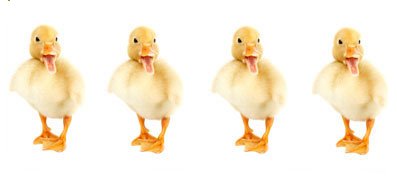Obsessive-Compulsive Disorder
or
Isn't It OK to Like All My Ducks in a Row?

Obsessive-Compulsive Disorder (OCD) is a lot more complicated than just being a "neat freak"
although the label gets tossed around pretty casually these days (as in, "OMG he's so OCD I can't even put my glass down without a coaster!").
There's nothing "casual" about OCD, however. The essential features of true Obsessive-Compulsive Disorder are the intrusive presence of obsessions (recurrent, usually disturbing thoughts) and/or compulsions (feeling driven to repeat certain behaviors or rituals) that are severe enough to be time consuming (for example, more than an hour a day) or cause the person experiencing them severe distress or impairment in normal routine, occupational or social functioning.
Although Obsessive-Compulsive Disorder may begin in childhood, it usually first appears gradually in adolescence or early adulthood, and is pretty evenly distributed between males and females in adulthood (it affects somewhat more boys than girls at younger ages). Although most people with the disorder experience both obsessions and compulsions, a relatively small percentage may experience only one or the other. The majority of individuals experience their symptoms as waxing and waning, and symptoms may get worse with stress, hormonal or other physical fluctuations.
Folks with OCD are well aware that their obsessions and compulsions are a little over the top,
perhaps so much so that they may be embarrassed or fearful of being thought "crazy" to ask for help or reveal their symptoms to someone else. News stories and features (20/20, Oprah), TV shows like Monk, and outspoken personalities like comedian Howie Mandel, have gone a long way in letting people with OCD symptoms know they're not alone, not crazy, and that there's effective help available.
Obsessions commonly take the form of repetitive thoughts or fears about germs or contamination, doubts (wondering whether one has done or neglected to do something), intense distress when something is moved or out of order, or worries about disturbing impulses (such as to shout an obscenity in church). Compulsions may take the form of repetitive behaviors like hand washing or door knob turning, feeling driven to check and recheck something, or intricately created rituals that the person feels must be adhered to specifically to avoid something bad from happening.
Now, everybody has superstitions about something, or gets a thought stuck in their head occasionally, or returns home to check if they left the iron on because they just have to every so often.
Remember, in order to be considered a disorder, OCD-like symptoms have to create severe distress and disruption in a person's life.
To warrant a diagnosis of Obsessive-Compulsive Disorder, the following criteria must be met, according to the Diagnostic and Statistical Manual of Mental Disorders, fifth edition (DSM-5):
A. Either obsessions, compulsions, or both must be present
Obsessions are defined as follows:
- Recurrent and persistent thoughts, urges, or images that are experienced at some time during the disturbance, as intrusive and inappropriate and that cause marked anxiety or distress
- The individual attempts to ignore or suppress such thoughts, impulses, or images, or to neutralize them with some other thought or action (i.e., by performing a compulsion)
Compulsions are defined as follows:
- Repetitive behaviors (e.g., hand washing, ordering, checking) or mental acts (e.g., praying, counting, repeating words silently) that the individual feels driven to perform in response to an obsession, or according to rules that must be applied rigidly
- The behaviors or mental acts are aimed at preventing or reducing anxiety or distress or preventing some dreaded event or situation; however, these behaviors or mental acts are not connected in a realistic way with what they are designed to neutralize or prevent, or are or are clearly excessive
B. The obsessions or compulsions are time-consuming (e.g. take more than 1 hour per day) or cause clinically significant distress or impairment in social, occupational, or other important areas of functioning
C. The obsessive-compulsive symptoms are not attributable to the phsysiological effects of a substance or other medical condition
D. The symptoms are not better explained by the symptoms of another mental disorder
Of all the anxiety disorders, Obsessive-Compulsive Disorder may be the one most likely to have a biochemical base
and most likely to benefit from a medical component to treatment. SSRI (selective serotonin reuptake inhibitor) medications have been particularly successful in relieving symptoms, and have even greater success when combined with behavior therapy. Unfortunately, there is not yet a reliable diagnostic test for OCD; it is only properly diagnosed by a comprehensive face-to-face interview with a licensed mental health professional.
Do you or does someone you know need help with OCD?
OCD can be successfully treated. Hooray!
Ready to end your anxiety? Help is just a click away.
Return to Anxiety Disorders from Obsessive-Compulsive Disorder
Return Home from Obsessive-Compulsive Disorder